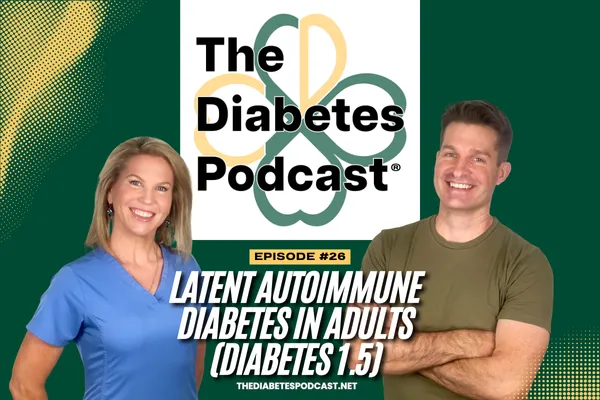
EP026 - Latent Autoimmune Diabetes in Adults
Diabetes 1.5 (LADA): What It Is, Why It’s Missed, and How to Get the Right Help
“About 10% of adults diagnosed with type 2 actually have Diabetes 1.5, also called LADA.”
Welcome to The Diabetes Podcast blog. Today we’re talking about something many people miss: Diabetes 1.5. You may also hear it called LADA, which stands for latent autoimmune diabetes in adults.
If you were told you have type 2 but meds aren’t working, this might be your story. If your doctor suddenly talks about insulin and you feel confused, this is for you. LADA can feel like living between type 1 and type 2. It’s not your fault. It’s autoimmune.
What Is Diabetes 1.5 (LADA)?
Diabetes 1.5 is an autoimmune diabetes. Your immune system attacks the beta cells in your pancreas that make insulin.
It starts in adults, often between ages 30 and 50, and moves slower than classic type 1.
It looks a lot like type 2 at first. Same symptoms: thirst, peeing a lot, tiredness, weight loss, high blood sugar.
But the cause is different. It’s not about willpower. It’s not because you ate “bad” foods. It’s your immune system.
Why It’s Often Missed
Most adults with high blood sugar get labeled “type 2” at first.
About 1 in 10 adults told they have type 2 actually have Diabetes 1.5 (LADA).
Many people with LADA have a normal BMI (around 22–23), and often don’t have high blood pressure at diagnosis.
Family history can be a clue: thyroid disease, celiac, or rheumatoid arthritis in the family may raise risk.
People with LADA often have higher A1C numbers over time because standard type 2 treatments don’t fix the root cause.
A Common Story
You start metformin or an SGLT2 (like Jardiance or Farxiga).
You eat better and walk daily.
Your sugars don’t budge. Your A1C even goes up.
You feel like you’re failing.
Then one day, an antibody test says: it’s LADA.
The plan shifts. Insulin becomes part of your care.
How LADA Is Different From Type 1 and Type 2
Like type 1: It’s autoimmune. You will likely need insulin.
Unlike classic type 1: It starts later and can be slower at first.
Unlike type 2: Weight loss and typical type 2 meds may not work well. It’s not mainly about insulin resistance.
Key Signs to Ask About LADA
Ask your doctor about LADA testing if:
You’re under ~48 and have a normal BMI.
Your A1C stays high even with lifestyle changes and type 2 meds.
You or your family have autoimmune diseases (thyroid, celiac, rheumatoid arthritis).
You keep needing “more meds,” but sugars still climb.
The Tests to Request
GAD antibody test (GAD65). Most people with LADA test positive.
C-peptide test. This shows how much insulin your body still makes.
Low C-peptide suggests insulin deficiency (fits LADA).
High C-peptide suggests insulin resistance (fits type 2).
Why Early Insulin Matters
Starting insulin early can help protect your remaining beta cells.
It can keep A1C in a safer range sooner and lower long-term risks.
Waiting too long can raise the risk of diabetic ketoacidosis (DKA), especially in men with LADA.
Early help means better health and more peace of mind.
What Treatment Can Look Like
Many people with LADA do best with insulin sooner, not later.
Tools that help:
Continuous glucose monitors (CGMs) like Dexcom G6/G7 or Libre 3.
Automated insulin delivery (AID) systems (an insulin pump + CGM that “talk” to each other). Tubeless options exist if tubes aren’t your thing.
Insurance:
Coverage varies. Some systems go through pharmacy benefits; others are durable medical equipment and may need a C-peptide result.
A diabetes care team can help you navigate coverage.
Do Lifestyle Changes Still Matter?
Yes. Even with Diabetes 1.5, lifestyle helps reduce stress on your body:
Move daily. Walk after meals to help lower blood sugar.
Eat colorful fruits and veggies to lower oxidation.
Manage stress and sleep well.
These won’t stop the autoimmune attack, but they can improve your day-to-day numbers and how you feel.
Emotions, Identity, and Support
LADA can feel confusing. You don’t fit neatly in the “type 1” or “type 2” box.
You may feel tired of explaining why you need insulin as an adult. That’s normal.
Shame is not helpful. Action is.
Build your care team: an endocrinologist, diabetes educator, dietitian, therapist, and supportive peers.
Your health story is yours. Share as much or as little as you want.
When to Push for Answers
If, within 3–6 months of a “type 2” plan (and you’re truly following it), your sugars are still rising or your A1C isn’t dropping, ask about:
GAD antibodies (GAD65)
C-peptide
A referral to an endocrinologist
Quick FAQ
Is Diabetes 1.5 the same as type 2? No. It’s autoimmune.
Will I need insulin? Most likely, yes—and starting sooner can help.
Can it go into remission like type 2 sometimes can? No. But you can still live well with the right tools.
Can I use a CGM or pump? Often yes. Talk with your care team about options and coverage.
Could I have DKA? Without proper insulin treatment, yes. That’s why early, correct diagnosis matters.
Your Next Steps
If your numbers aren’t improving, ask for GAD and C-peptide tests.
Ask for a referral to an endocrinologist.
Discuss CGM and insulin options, including automated insulin delivery.
Build your support team. You’re not alone.
Closing
Diabetes 1.5 (LADA) is real, common, and often missed. Getting the right diagnosis early can protect your health and your peace of mind.
Have questions? Email us at [email protected]. If this helped you, please share it and subscribe to The Diabetes Podcast.
Disclaimer
The information in this blog post and podcast is for educational and informational purposes only. It is not medical advice, diagnosis, or treatment, and it does not replace a one-on-one relationship with your physician or qualified healthcare professional. Always talk with your doctor, pharmacist, or care team before starting, stopping, or changing any medication, supplement, exercise plan, or nutrition plan—especially if you have diabetes, prediabetes, heart, liver, or kidney conditions, or take prescription drugs like metformin or insulin.
Results vary from person to person. Examples, statistics, or studies are shared to educate, not to promise outcomes. Any discussion of medications, dosing, or side effects is general in nature and may not be appropriate for your specific situation. Do not ignore professional medical advice or delay seeking it because of something you read or heard here. If you think you are experiencing an emergency or severe side effects (such as persistent vomiting, severe diarrhea, signs of dehydration, allergic reaction, or symptoms of lactic acidosis), call your local emergency number or seek urgent care right away.
We strive for accuracy, but health information changes over time. We make no guarantees regarding completeness, timeliness, or suitability of the content and assume no liability for actions taken or not taken based on this material. Use of this content is at your own risk.
Links or references to third-party resources are provided for convenience and do not constitute endorsement. By reading, listening, or using this information, you agree to these terms and understand that you are responsible for your own health decisions in partnership with your licensed healthcare provider.

